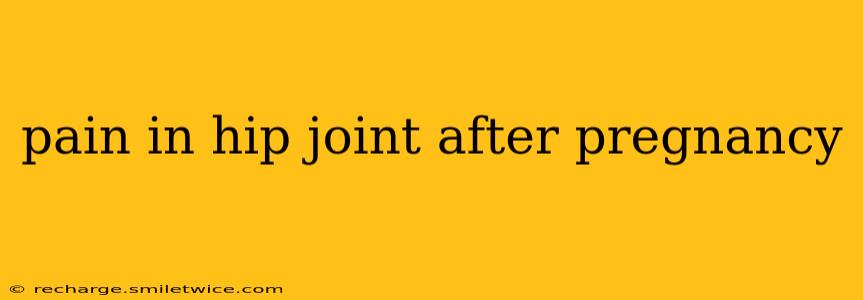Pregnancy and childbirth place immense stress on a woman's body, and one common consequence is persistent hip pain. This pain can range from a mild ache to a debilitating discomfort, significantly impacting a new mother's quality of life. Understanding the causes, seeking appropriate treatment, and implementing preventative measures are crucial for managing this prevalent postpartum issue.
What Causes Hip Pain After Pregnancy?
Several factors contribute to hip pain after pregnancy. The hormonal changes, weight gain, and postural shifts during pregnancy, combined with the physical demands of labor and delivery, can all play a role.
-
Hormonal Changes: Relaxin, a hormone produced during pregnancy, softens ligaments and joints to prepare the body for childbirth. While beneficial for delivery, this softening can lead to instability in the hip joint, making it more susceptible to pain and injury.
-
Weight Gain: The significant weight gain during pregnancy puts extra pressure on the hips and pelvis, exacerbating existing conditions or creating new ones.
-
Postural Changes: To accommodate the growing baby, pregnant women often adopt a swayback posture, shifting their center of gravity. This can strain the hip joints and surrounding muscles.
-
Muscle Weakness: Pregnancy weakens core muscles, including those supporting the hips and pelvis. This weakness contributes to instability and pain.
-
Pelvic Instability: The relaxation of ligaments can lead to pelvic instability, causing pain in the hip, groin, and lower back.
-
Diastasis Recti: Separation of the abdominal muscles (Diastasis Recti) can also contribute to hip pain by affecting core stability.
How is Hip Pain After Pregnancy Treated?
Treatment for postpartum hip pain depends on its severity and underlying cause. Many options are available, ranging from conservative approaches to more interventional therapies.
-
Physical Therapy: This is often the first line of defense. A physical therapist will assess your specific needs and create a personalized plan involving exercises to strengthen core muscles, improve hip mobility, and reduce pain. Techniques like pelvic floor exercises and manual therapy are often included.
-
Medication: Over-the-counter pain relievers like ibuprofen or acetaminophen can help manage pain and inflammation. In some cases, a doctor may prescribe stronger medications.
-
Chiropractic Care: Chiropractic adjustments can help realign the pelvis and spine, relieving pressure on the hip joint and reducing pain.
-
Osteopathic Treatment: Osteopathic treatment focuses on the musculoskeletal system and can address the biomechanical imbalances contributing to hip pain.
-
Rest and Ice: Resting the affected hip and applying ice packs can reduce inflammation and pain.
How Can I Prevent Hip Pain After Pregnancy?
While not all instances of postpartum hip pain are preventable, proactive measures can significantly reduce the risk.
-
Maintain a Healthy Weight: While weight gain during pregnancy is normal, maintaining a healthy weight before and during pregnancy can minimize the strain on the hips.
-
Regular Exercise: Engage in low-impact exercises such as swimming, walking, and prenatal yoga throughout pregnancy to strengthen core muscles and improve hip flexibility. Always consult your doctor or midwife before starting any new exercise program.
-
Proper Posture: Maintain good posture throughout pregnancy and postpartum to minimize strain on the hips and back. Consider using a supportive maternity belt.
-
Pelvic Floor Exercises: Strengthening your pelvic floor muscles through Kegel exercises can improve pelvic stability and reduce the risk of hip pain.
-
Postnatal Care: Seek professional guidance from a physical therapist or other healthcare provider after delivery to address any musculoskeletal imbalances and begin a tailored rehabilitation program.
What Exercises Can Help with Hip Pain After Pregnancy?
Several exercises can help alleviate hip pain after pregnancy. However, it's crucial to consult with a physical therapist or healthcare professional to determine the most appropriate exercises for your individual needs and condition. They can ensure you're performing the exercises correctly and safely to avoid further injury. Examples of exercises that may be recommended include gentle stretches, strengthening exercises targeting the core and hip muscles, and pelvic floor exercises.
When Should I See a Doctor About Hip Pain After Pregnancy?
Seek medical attention if your hip pain is severe, persistent, doesn't improve with self-care measures, or is accompanied by other symptoms like fever, numbness, or weakness in the leg. Early intervention is key to effective management and preventing long-term complications.
This information is for general knowledge and does not constitute medical advice. Always consult with a healthcare professional for diagnosis and treatment of any medical condition.
